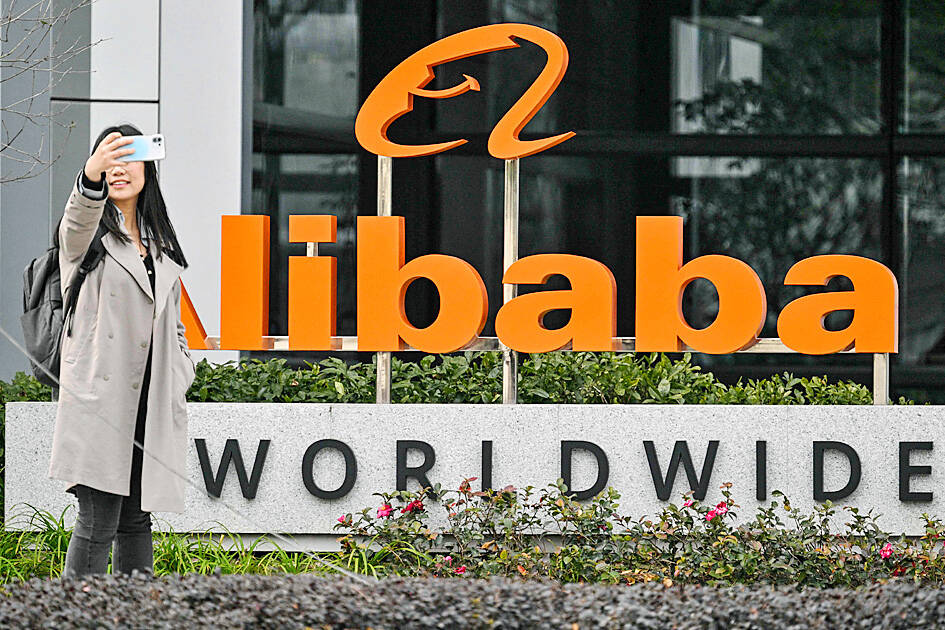Alibaba Group Holding Ltd (阿里巴巴) pledged to invest more than 380 billion yuan (US$52.4 billion) in artificial intelligence (AI) infrastructure such as data centers over the next three years, a major commitment that underscores the e-commerce pioneer’s ambitions of becoming a leader in AI.
The Internet company co-founded by Jack Ma (馬雲) plans to spend more on its AI and cloud computing network than it has over the past decade.
Alibaba envisions becoming a key partner to companies developing and applying AI to the real world as models evolve and need increasing amounts of computing power, the company said on its official blog.

Photo: AFP
That target is one of China’s biggest AI infrastructure budgets, underscoring Alibaba’s growing ambitions in the field. It comes after Alibaba last week posted its fastest pace of revenue growth in more than a year and Ma was seen meeting Chinese President Xi Jinping (習近平) at a televised summit in Beijing.
However, it also comes at a time investors are pondering whether big tech firms are overestimating future demand for AI services, or the capital needed to create them.
TD Cowen Inc analysts on Friday said Microsoft Corp is canceling leases for a substantial amount of data center capacity in the US — a move that might reflect concerns about whether it is building more AI computing than it would need over the long term.
Big tech firms from Meta Platforms Inc to Amazon.com Inc are pledging billions toward the data centers needed to train, develop and host AI services.
Wall Street has begun to question whether such investment is running ahead of reality, particularly after Chinese upstart DeepSeek (深度求索) unveiled a model trained for a fraction of the cost of many of its rivals.
However, many of the industry’s biggest names — including Nvidia Corp’s Jensen Huang (黃仁勳) — continue to argue that AI would simply transform the tech landscape.
Alibaba certainly falls in that camp. The Chinese company is now righting a business knocked off-kilter by a government clampdown that began in 2020, refocusing its ambitions on e-commerce and AI.
Last week, Alibaba chief executive officer Eddie Wu (吳泳銘) said that artificial general intelligence — powerful, hypothetical AI systems that could emulate or match human thinking capabilities — was now the company’s primary objective, joining a race so far led by the likes of OpenAI and big US firms like Alphabet Inc.
While a milestone for China, Alibaba’s three-year timeline lags behind its US peers.
Microsoft for one expects to spend US$80 billion this fiscal year on AI data centers, while Meta has earmarked some US$65 billion for this year. That’s in part because Alibaba is a relatively newer entrant to the field, although it has operated an Amazon Web Services-like platform globally for years.
Chinese firms in general are also limited by US sanctions from buying the most expensive Nvidia AI chips for their data centers — a factor that curtails computing power, but also helps cap costs.

‘SWASTICAR’: Tesla CEO Elon Musk’s close association with Donald Trump has prompted opponents to brand him a ‘Nazi’ and resulted in a dramatic drop in sales Demonstrators descended on Tesla Inc dealerships across the US, and in Europe and Canada on Saturday to protest company chief Elon Musk, who has amassed extraordinary power as a top adviser to US President Donald Trump. Waving signs with messages such as “Musk is stealing our money” and “Reclaim our country,” the protests largely took place peacefully following fiery episodes of vandalism on Tesla vehicles, dealerships and other facilities in recent weeks that US officials have denounced as terrorism. Hundreds rallied on Saturday outside the Tesla dealership in Manhattan. Some blasted Musk, the world’s richest man, while others demanded the shuttering of his

Taiwan’s official purchasing managers’ index (PMI) last month rose 0.2 percentage points to 54.2, in a second consecutive month of expansion, thanks to front-loading demand intended to avoid potential US tariff hikes, the Chung-Hua Institution for Economic Research (CIER, 中華經濟研究院) said yesterday. While short-term demand appeared robust, uncertainties rose due to US President Donald Trump’s unpredictable trade policy, CIER president Lien Hsien-ming (連賢明) told a news conference in Taipei. Taiwan’s economy this year would be characterized by high-level fluctuations and the volatility would be wilder than most expect, Lien said Demand for electronics, particularly semiconductors, continues to benefit from US technology giants’ effort

TIGHT-LIPPED: UMC said it had no merger plans at the moment, after Nikkei Asia reported that the firm and GlobalFoundries were considering restarting merger talks United Microelectronics Corp (UMC, 聯電), the world’s No. 4 contract chipmaker, yesterday launched a new US$5 billion 12-inch chip factory in Singapore as part of its latest effort to diversify its manufacturing footprint amid growing geopolitical risks. The new factory, adjacent to UMC’s existing Singapore fab in the Pasir Res Wafer Fab Park, is scheduled to enter volume production next year, utilizing mature 22-nanometer and 28-nanometer process technologies, UMC said in a statement. The company plans to invest US$5 billion during the first phase of the new fab, which would have an installed capacity of 30,000 12-inch wafers per month, it said. The

ADVERSARIES: The new list includes 11 entities in China and one in Taiwan, which is a local branch of Chinese cloud computing firm Inspur Group The US added dozens of entities to a trade blacklist on Tuesday, the US Department of Commerce said, in part to disrupt Beijing’s artificial intelligence (AI) and advanced computing capabilities. The action affects 80 entities from countries including China, the United Arab Emirates and Iran, with the commerce department citing their “activities contrary to US national security and foreign policy.” Those added to the “entity list” are restricted from obtaining US items and technologies without government authorization. “We will not allow adversaries to exploit American technology to bolster their own militaries and threaten American lives,” US Secretary of Commerce Howard Lutnick said. The entities